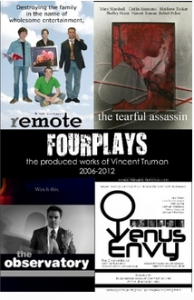Fourplays: Produced Works, 2006-2012
 In an effort to get my creative ducks in a row, I have compiled and self-published a collection of my first four plays to be produced, under the dubious and ham-fisted title of “Fourplays.” Adding in synopses, character descriptions, commentaries and an array of photographs from each show’s inaugural performances, I have created a nice 355-page snapshot of the creative years of 2006-2012.
In an effort to get my creative ducks in a row, I have compiled and self-published a collection of my first four plays to be produced, under the dubious and ham-fisted title of “Fourplays.” Adding in synopses, character descriptions, commentaries and an array of photographs from each show’s inaugural performances, I have created a nice 355-page snapshot of the creative years of 2006-2012.
The book starts with “Remote”, my second produced play (the first, a satire of the improv comedy world called “Ensemble” was well-intentioned but absymal) and first to be written solo following four years as head writer for a sketch comedy group called Suspicious Clowns. ”Remote” follows a team of indie filmmakers as they attempt to capture a normal American family – but when they prove to be too normal, the director and assistant director start creating havoc, from encouraging the daughter to experiment in cutting to severing the brake lines of the father’s truck, in order to get good television. The source material for this play can be found in ABC-TV’s short-lived “The Beast”, with Elizabeth Mitchell, CBC-TV’s bitter “The Newsroom”, with Ken Finkleman and a dose of BBC’s “Fawlty Towers.” It was a good piece, and stands as a good character study of the increasingly ADD-addled and fame-hungry public.
The second piece, “The Tearful Assassin”, was to be a sequel, following the same director and assistant director as they made entertaining fodder out of a teenaged girl’s kidnapping. Finding the idea of a sequel boring, I stripped out the comedy and instead created three parallel mini-plays: that of the parents’ reactions, which lead to a book deal for the mother, the detectives’ examination of the case, and the teenaged girl’s own personal hell at the hands of a sociopath.
“The Observatory”, which followed in 2010, was an altogether different beast. Instead of taking reality and shoehorning into a play, I took a play and shoehorned it into reality. In this play, a good teacher is offered a mass amount of money in order to watch a “person of interest” for a year, in the form of a hologram projected in the teacher’s (and his wife’s) attic. The teacher’s growing obsession with this “virtual world” eventually strips him of his marriage and dignity, leading him to compromise his own personal beliefs and vows. That the play horrifically foretold the end of my own marriage, two years before my divorce, is rather painful and fascinating to me. I often find that my writing allows my subconscious to slip through and try and tell me what’s going on in my conscious mind, but I can never tell until after the fact.
The final piece is much more of a character study. 2012′s “Venus Envy”, dabbled with but not written until after my divorce, tracks three women in a world in which women are the “dominant” sex. In the piece, I make it a strong point to not only mirror some of the idiotic assumptions that men learn but also to expand on those assumptions from a female perspective. The end result – that finding common language is an often brutal and untenable mountain to climb – made for a very satisfactory play. During the rehearsal process, I am still taken aback with how much discussion the play inspired between the actors. For that reason, I staged numerous “talk back sessions” during the show’s run and was equally impressed with how much thought the piece inspired to those who came to see it.
Each of the plays, in their own way, are my favorite. ”Remote” and its offensive comedy; “Assassin” with its journalistic and nonjudgmental reading; “Observatory” with its imaginative peek into fear and ambition; “Venus” with its leveling of the sexual playing field. Little niggles aside, I would love to see these productions live again.



